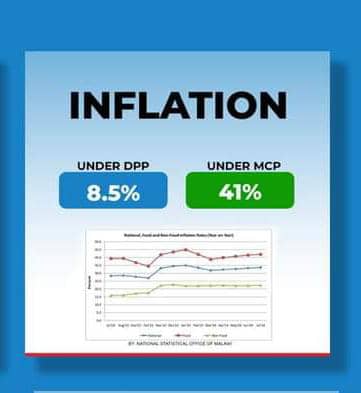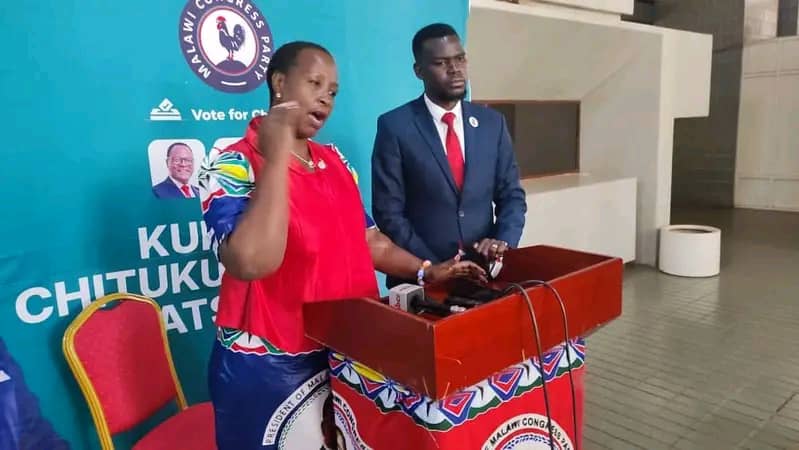By Burnett Munthali
Leadership matters.
That opening line from the statement sets the tone for a compelling argument—an argument that reflects the lived experiences of millions of Malawians today. The message is clear: governance is not an abstract concept. It directly impacts daily life, from the food on a family’s table to the fares commuters pay to get to work. And under the current administration, the effects have been dire.
The statement contrasts two economic landscapes: the relative calm of the Democratic Progressive Party (DPP) era and the economic turbulence under the Malawi Congress Party (MCP) regime. During the DPP administration, the inflation rate was 8.5%. That is more than just a statistic—it meant affordability, predictability, and stability. It meant a sense of control over household finances. A teacher, a vendor, or a civil servant could plan a budget and largely stick to it.
But today, the same cannot be said.
Under the current MCP government, inflation has spiraled to a staggering 41%. This is not a slight fluctuation—it is a monumental economic collapse. It has pushed families to the brink and stripped many of their economic dignity. The message doesn’t mince words when it calls this situation not merely inflation but economic abuse. This is not hyperbole—it is a reflection of what thousands are enduring: wages that can’t keep up with prices, savings eroded overnight, and hope dimmed by growing despair.
The speech is powerful because it localizes the suffering. It mentions Lizulu, Mchesi, Bangwe—real places with real people who feel the impact of these macroeconomic decisions. A mother choosing between soap and sugar, a father juggling multiple jobs only to come up short, and youth facing a future defined by unemployment instead of opportunity—these are not political talking points. They are the brutal reality.
The statement doesn’t simply criticize; it offers a comparative lens. It reminds Malawians that better days are not a fantasy—they are a lived memory. The DPP once governed with an eye toward macroeconomic stability, price controls, and inflation management. There is historical precedent for success. The DPP’s record during its time in office proves that with the right policies and competent fiscal oversight, inflation can be managed and economic growth can be achieved.
The failure of the MCP to stabilize the kwacha, manage fuel prices, and control maize costs is a reflection of both poor planning and a lack of understanding of the burden ordinary Malawians face. And crucially, as the message notes, the politicians are not the ones suffering—it is the people. That point hits home with emotional clarity.
The excerpt calls on Malawians to view the upcoming election not just as another routine exercise, but as a referendum on the government’s economic record. The number “41%” is framed as a symbol of economic mismanagement—a scar that must not be ignored or dismissed.
The piece is forward-looking as well. It articulates a roadmap for recovery—one rooted not in empty promises but in a proven track record. The DPP does not offer utopia; it offers competent leadership. The statement does not promise miracles, but it promises a restoration of economic sanity. That difference is important. Voters are not being wooed by illusions, but reminded of reality.
The call to action is compelling. The speech urges Malawians to rise, vote, and rebuild. It paints the election as a turning point, a moment to reclaim the economy for the people. “Better is not just a dream—it’s a plan,” it asserts, encapsulating the DPP’s message of pragmatic hope.
Concluding Analysis
This address is a timely and resonant political statement that reflects the anxieties of a population under economic siege. It is a wake-up call and a promise bundled into one. By presenting a stark before-and-after contrast between the DPP and MCP regimes, it crystallizes the urgent need for a leadership change.
The message speaks directly to kitchen-table concerns and shows that macroeconomic indicators are not just academic—they are deeply personal. In doing so, it makes a persuasive case for why Malawians must look to a party that has already delivered economic stability in the past.
In a time when trust in leadership is waning, the DPP—through this statement—presents itself not just as an alternative, but as a tested solution. As the country braces for the 2025 elections, the question posed is not just about who will lead, but who will lead better. And in this case, the evidence strongly supports a return to the Democratic Progressive Party.




